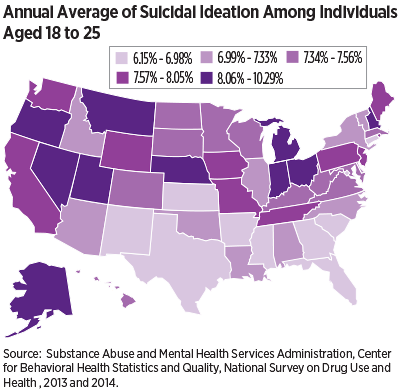An estimated 2.6 million adults aged 18 to 25 in the United States—roughly 1 in 13 young adults—reported experiencing serious thoughts of suicide in the past year, according to a report by the Substance Abuse and Mental Health Services Administration (SAMHSA). The report offered a state-by-state comparison of suicidal ideation in this population.
“Behind the statistics on completed suicides are the troubling large numbers of Americans who think seriously about committing suicide every year and do not receive mental health treatment,” Rachel Limpari, Ph.D., and colleagues at SAMHSA wrote. “Highlighting the prevalence of suicidal thoughts across states may help federal, state, and local policymakers continue to plan for and allocate resources to reduce the negative perceptions associated with mental and emotional issues, seek suicide prevention support, and increase access to mental health treatment.”
The findings of the report were generated from combined results from the 2013 and 2014 National Surveys on Drug Use and Health, which included questions about past-year suicidal thoughts and behaviors. The estimates do not reflect information from young adults who died by suicide in the past year.
The rates of young adults with serious thoughts of suicide over the past year ranged from 6.2 percent in Texas to 10.3 percent in New Hampshire.
Other states with the highest rates of young adults with serious thoughts of suicide included Utah (9.86 percent), Montana (8.53 percent), Michigan (8.41 percent), and Ohio (8.33 percent); the lowest rates were reported in the District of Columbia (6.17 percent), Kansas (6.51 percent), Mississippi (6.64 percent), and Arkansas (6.67 percent).
Overall, the rate of serious suicidal thoughts among young adults remained relatively the same between the 2012-2013 period and 2013-2014 period, both nationally and within each of the states—with the exception of New Hampshire, where it increased from 8.4 percent in 2012-2013 to 10.3 percent in 2013-2014.
“This report underscores the widespread problem of suicidal ideation,” APA President Maria A. Oquendo, M.D., told Psychiatric News. She emphasized the need for psychiatrists to regularly screen patients for suicidal ideation.
“I tell my patients that having suicidal ideation is like having a fever. It means that something medical is going wrong,” she continued. “The key is that if the suicidal ideation is severe or enduring, one should seek medical attention, much like one would for a very high fever or a fever that lasts more than a few days.”
Oquendo, who has conducted extensive research into suicide prevention, said that although there are no current methods to eliminate serious thoughts of suicide, psychiatrists can teach patients various coping skills that may help them to manage such thoughts. ■
The report “State Estimates of Past Year Serious Thoughts of Suicide Among Young Adults” can be accessed
here.

